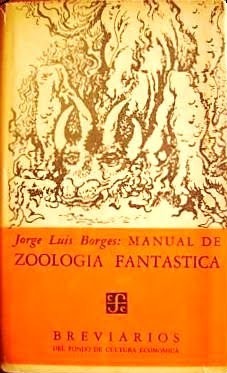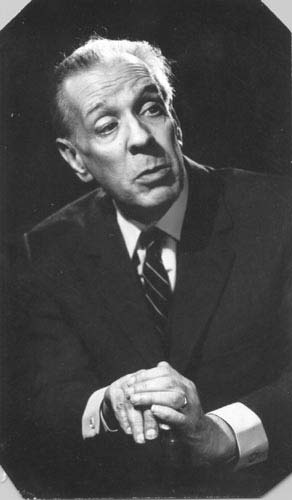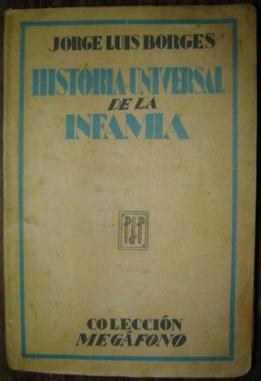
Jorge Francisco Isidoro Luis Borges Acevedo was an Argentine short-story writer, essayist, poet and translator regarded as a key figure in Spanish-language and international literature. His best-known works, Ficciones (transl. Fictions) and El Aleph, published in the 1940s, are collections of short stories exploring motifs such as dreams, labyrinths, chance, infinity, archives, mirrors, fictional writers and mythology. Borges's works have contributed to philosophical literature and the fantasy genre, and have had a major influence on the magic realist movement in 20th century Latin American literature.

Adolfo Bioy Casares was an Argentine fiction writer, journalist, diarist, and translator. He was a friend and frequent collaborator with his fellow countryman Jorge Luis Borges. He is the author of the Fantastique novel The Invention of Morel.
Mayra Santos-Febres is a Puerto Rican author, poet, novelist, professor of literature, essayist, and literary critic and author of children's books. Her work focuses on themes of race, diaspora identity, female sexuality, gender fluidity, desire, and power. She is a cultural activist who helps to bring books to young readers and the less fortunate. Her writings have been translated into French, English, German, and Italian.

The Book of Imaginary Beings was written by Jorge Luis Borges with Margarita Guerrero and published in 1957 under the original Spanish title Manual de zoología fantástica. It contains descriptions of mythical beasts from folklore and literature. In 1967 the authors published an expanded edition retitled as El libro de los seres imaginarios. Borges collaborated on the first English translation, which was praised upon its publication in 1969.

Labyrinths is a collection of short stories and essays by Argentine writer and poet Jorge Luis Borges. It was translated into English, published soon after Borges won the International Publishers' Prize with Samuel Beckett.

This is a bibliography of works by Argentine short-story writer, essayist, poet, and translator Jorge Luis Borges (1899–1986).
J. M. Cohen was a prolific British translator of European literature into English.
Norman Thomas di Giovanni was an American-born editor and translator known for his collaboration with Argentine author Jorge Luis Borges.

María Kodama Schweizer was an Argentine writer and translator. The widow of author Jorge Luis Borges, she was the sole owner of his estate after his death in 1986. Borges had bequeathed to Kodama his rights as author in a will written in 1979, when she was his literary secretary, and bequeathed to her his whole estate in 1985. They were married in 1986, shortly before Borges' death.

Latin American literature consists of the oral and written literature of Latin America in several languages, particularly in Spanish, Portuguese, and the indigenous languages of Latin America. This article is only about Latin American literature from countries where Spanish is the native/official language. Even though these 18 countries share a language, each one has its unique literary traditions although they often overlap with those of other countries. Here only the most general literary trends are discussed. Latin American literature rose to particular prominence globally during the second half of the 20th century, largely due to the international success of the style known as magical realism. As such, the region's literature is often associated solely with this style, with the 20th century literary movement known as Latin American Boom, and with its most famous exponent, Gabriel García Márquez. Latin American literature has a rich and complex tradition of literary production that dates back many centuries.

An estancia or estância is a large, private plot of land used for farming or raising cattle or sheep. Estancias are located in the southern South American grasslands of Chilean and Argentine Patagonia, while the pampas, have historically been estates used to raise livestock, such as cattle or sheep. In Puerto Rico, an estancia was a farm growing frutos menores; that is, crops for local sale and consumption, the equivalent of a truck farm in the United States. In Chile and Argentina, they are large rural complexes with similarities to what in the United States is called a ranch.

Dreamtigers is a collection of poems, short essays and literary sketches by the Argentine author Jorge Luis Borges. Divided fairly evenly between prose and verse, the collection examines the limitations of creativity. Borges regarded Dreamtigers as his most personal work. In the view of Mortimer Adler, editor of the Great Books of the Western World series, the collection was a masterpiece of 20th-century literature. Literary critic Harold Bloom includes it in his Western Canon.
Jorge is the Spanish and Portuguese form of the given name George. While spelled alike, this name is pronounced very differently in each of the two languages: Spanish ; Portuguese.
Margaret ("Petch") Sayers Peden was an American translator and professor emerita of Spanish at the University of Missouri. Prior to her death in 2020, Peden lived and worked in Columbia, Missouri.

The alicanto, in Chilean mythology, is a nocturnal flightless bird of the Atacama desert, which is said to run at night with glowing outspread wings, glittering in the gold or silver color deriving from the precious ores it supposedly eats. Some say it has strangely shining eyes. If the bird can be successfully without being noticed, it will lead the miner or prospector to a mother lode of gold or silver. But if the bird detects a human, it is said to extinguish its illumination, then disappear into darkness, or worse, lead the human to a perilous fall from a precipice.
Edgardo Rodríguez Juliá is a Puerto Rican essayist and novelist.

A Universal History of Infamy, or A Universal History of Iniquity, is a collection of short stories by Argentine writer Jorge Luis Borges, first published in 1935, and revised by the author in 1954. Most were published individually in the newspaper Crítica between 1933 and 1934. Angel Flores, the first to use the term "magical realism", set the beginning of the movement with this book.
Luce López-Baralt is a prominent Puerto Rican scholar and essayist and a professor of Spanish and Comparative Literature at the University of Puerto Rico.
"Borges and I" is a short story by the Argentine writer and poet Jorge Luis Borges. It is one of the stories in the short story collection The Maker, first published in 1960.

American literature in Spanish in the United States dates back as 1610 when the Spanish explorer Gaspar Pérez de Villagrá published his epic poem Historia de Nuevo México. He was an early chronicler of the conquest of the Americas and a forerunner of Spanish-language literature in the United States given his focus on the American landscape and the customs of the people. However, it was not until the late 20th century that Spanish language literature written by Americans was regularly published in the United States.











